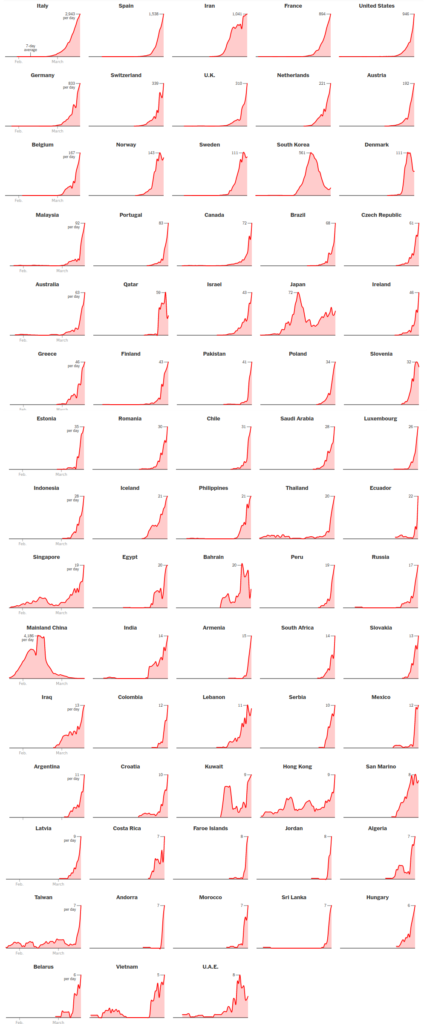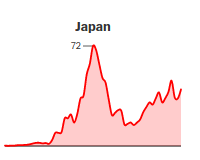Firstly a diclaimer:
I AM NOT A DOCTOR.
I AM NOT A MEDICAL RESEARCHER.
I AM NOT A SPECIALIST IN ANY WAY.
I AM A TOTAL LAYMAN WITH A PHONE, AN INTERNET CONNECTION, AND A WHOLE BUNCH OF EMOTIONAL AND COGNITIVE BIASES THAT INFLUENCE MY JUDGMENT.
DO NOT FOLLOW MY ADVICE.
DO YOUR OWN RESEARCH.
MAKE YOUR OWN JUDGMENTS.
TAKE YOUR OWN DECISIONS.
Ok, with that out of the way, here are my layman thoughts:
A blog post (link below) by another layman with an internet connection (a Japanese national living in Australia) suggests a hypothesis that the differences in speed of spread and severity of infection between different regions of the world may be due to BCG vaccination programs, with the important distinction that not all BCG vaccinations are the same, and that the so-called “Japan Strain” (an older strain, used in Japan and several other countries, particularly in Asia) may be more effective in providing resistance to the Covid-19 virus (this would explain why some countries with a BCG program are experiencing rapid spread: they use other strains that do not provide the same resistance).
https://www.jsatonotes.com/2020/03/if-i-were-north-americaneuropeanaustral.html?m=1
This hypothesis appears to be being taken seriously by the scientific/medical community – the comments section of the above blog post provides some additional information and discussion (including from people who in their comments state that they are doctors, researchers, or have some relevant specialist knowledge).
There are also relevant reports in the wider media:
https://neurosciencenews.com/covid-19-bcg-vmp1002-vaccine-15966/
There is also this Japanese-language article that states that the BGC vaccine has been successfully used as a treatment for pneumonia in bedridden elderly patients.
https://medical.nikkeibp.co.jp/inc/all/hotnews/archives/237265.html
(In addition to the question of effectiveness, this would appear to suggest that the BCG vaccine is safe to get, even when sick, and thus presumably safe to get when healthy….unless of course the patients were so serious that the risk from pneumonia outweighed the risk from the vaccine, however the vaccine has a very long history and appears to be considered safe[citation needed, go find one dear reader!!].)
If this hypothesis turns out to have value, it may be one of the factors that lead to what is being called “The Japan-Covid-19 Riddle” (日本の謎). See this article for a good overview:
https://www.nytimes.com/2020/03/26/world/asia/japan-coronavirus.html
At present the Covid-19 situation in Japan is a puzzling anomaly: a unique (some would say flawed) approach that focuses on identifying clusters and has not (until very recently) included wide testing or extensive social distancing measures (and still does not include any lockdown whatsoever), combined with what appears to be a slow spread of infection, and low numbers of serious patients and fatalities (thus far…).
This graphic shows that Japan’s spread of infection is basically unique in the world – spot the odd one out:

There are many different possible explanations for this (hygiene, bowing not handshaking, masks, skewed statistics, the Olympics) and this Japan-strain BCG hypothesis is merely one of those possible explanations.
Relevance to non-Japanese-by-upbringing people living in Japan
If Japan truly is experiencing a slower spread and reduced severity of Covid-19 infection this COULD be due to the national Japan-strain BCG vaccine program. However, because at this point there is no indication that the BCG vaccine is providing “herd immunity”, it is not safe to assume that the actual spread of the virus is any slower: only that the number of people reporting symptoms is fewer.
In fact this MIGHT make the situation worse for people living in Japan who haven’t had the Japan-strain BCG vaccine:
1) Lower symptom levels mean more asymptomatic spread since people don’t realize they are infected.
2) Fewer serious cases will mean the Japanese government will be less likely to declare a state of emergency, because there is no danger of “overshoot” of treatment capacity. The resulting social interaction will mean the actual spread continues.
3) It thus follows that people lacking the partial additional resistance provided by the Japan-strain BCG will be at greater risk of infection and severity than is revealed by statistics on the Japanese population at large.
4) However without the treatment overshoot problem, the probability of getting effective treatment (drugs, ventilators, ICU) is higher (in fact current policy is to hospitalize all positive cases, regardless of symptoms).
Additional point: Elderly people in Japan
According to this:
https://ja.wikipedia.org/wiki/BCG#%E6%97%A5%E6%9C%AC%E3%81%AB%E3%81%8A%E3%81%91%E3%82%8BBCG%E3%83%AF%E3%82%AF%E3%83%81%E3%83%B3%E6%8E%A5%E7%A8%AE
(sorry, wikipedia reference!)
the BCG vacinnation program was started in 1951 which means that any Japanese people over 70 years of age may also be lacking the additional immunity protection provided by a Japan-strain BCG vacinne. In addition to the clear worldwide pattern of older people being more at risk. the above 4 reasons why non-Japanese in Japan may be more at risk also presumably applies to elderly people in Japan who have not had the national BCG vaccine.
Further research is required…ideally as quickly as possible
Everything in my post, and the original post by Jun Sato, is a testable hypothesis: all we would need is a wide testing program (called for explicitly by the WHO) combined with a breakdown of the infection and illness rates by nationality and age, or better yet by “did they have a Japan-strain BCG vaccination?”.
Can you get a BCG vaccination shot as an adult in Japan?
I’ve been researching/phoning and you CAN go to certain hospitals to get an adult BCG. Please note that not all hospitals will administer to adults, mainly because in Japan the BCG vaccine is generally administered to babies – a lot of the hospitals that administer it are therefore Pediatric Departiments/Clinics (小児科) which will not (generally) see adult patients.
If/when you find a hospital that will do it, it’ll cost 8,000yen (+tax) and some hospitals will want to test you for antibodies first (the result will take 2 days and then they will jab you), although some hospitals seem prepared to do the jab straight away with no test.
This is relevant to people from countries with a (non-Japan-strain) BCG vaccination program: the test result will come back with “this person already has antibodies so doesn’t need the vaccine” however according to the” Japan-strain-BCG-region theory” (the original blog post) it matters what kind of BCG vaccine they had: many countries use a strain of the BCG that may not be effective against Covid-19.
In short: to improve resistance to Covid-19 a person needs a Japan-strain BCG vaccination regardless of whether they have antibodies against TB from a previous (non-Japan-strain) vaccination, so the antibodies test is basically irrelevant.
A doctor very kindly phoned a tuberculosis specialist (BCG is a vaccine against tuberculosis) who said that there IS a downside to having the jab if you have already had a BCG vaccine (which will depend on your country):
- increased risk of inflammation (which if it persists might require a course of antibiotics)
- increased risk keloid formation (basically overgrowing scar tissue), again which if it persists might require additional treatment.
Basically the jab is an infection that, because you already have antibodies, your immune system will fight harder than if you didn’t already have antibodies….I think: this is just my inference, take this part with a pinch of salt…in fact, take this WHOLE POST with a pinch of salt, I AM NOT A SPECIALIST).
For this reason the doctor said he did not recommend the vaccine for reasons of Covid-19, but he said he would not object to administering it if that was a patient’s request.
For additional context, for what it’s worth I would like to state that the doctor I spoke to seemed aware of the seriousness of the Covid-19 situation – he even said “we doctors are doing what we can to urge stronger action by the government”. Overall he was very friendly, understanding, and helpful.
Finally there is one more risk factor in the current situation: if you decide you want the vaccine you’re going to need to visit a hospital right when you want to be avoiding hospitals like….the plague (erm….sorry).
However, this risk needs to be balanced against the contrary risk of infection and seriousness of illness from Covid-19 (which is currently difficult to quantify).
However it is also important to note that for any one individual (“you”) the risk of
A) infection, and
B) serious illness
is of course low. (it’s tempting at this point to compare Covid-19 statistics to road accident statistics, but I will leave that for another day….)
Conclusion
There is an untested unconfirmed hypothesis that the Japan-strain BCG vaccine provides partial resistance to the Covid-19 infection.
However since it likely does not confer herd immunity, anyone in the larger population who has not had a Japan-strain BCG vaccination MAY be at greater risk of infection from that general population, and at greater risk of developing serious illness, than the wider Japanese population as represented in national statistics on Covid-19 infection and illness. This includes foreign-born residents and Japanese people over 70.
If the above is true, it follows that a program within Japan to vaccinate people who have not had a Japanese-strain BCG would seem to be a good idea.
It also follows anyone who has not had the Japan-strain BCG vaccination might reduce their risk of infection / seriousness by getting the vaccine. However anyone considering this will need to weigh the benefits of the vaccine against the risks of visiting a hospital at this point in time.
Finally, if the BCG vaccine theory turns out to have value then Japan is probably excellently placed to ramp up manufacture and start exporting it.
And finally, my disclaimer again:
I AM NOT A SPECIALIST IN THIS FIELD.
DO NOT FOLLOW MY ADVICE.
MAKE YOUR OWN DECISIONS.
Thank you for reading, if this is of any help to anyone whatsoever then I am happy I spent the time on it.


Hi. I came here from jsatonotes.^^
I’d like to add that a lot of elderly people in Japan did get the BCG vaccine, just not as babies. I asked a few people in their eighties and they said they got the shot at school. My dad mentioned that the shot was so painful kids would start crying. I believe that when they started the vaccine program in 1951 they didn’t just vaccinate the babies but a lot of (most of?) children too. Tuberculosis was pretty rampant back then.